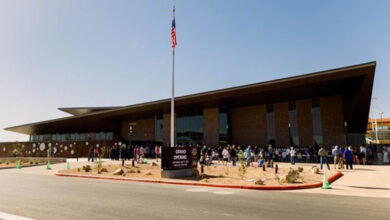
BBB Warns Southern Arizonans of Robocalls Promising “Energy Savings”
Better Business Bureau Serving Southern Arizona is alerting consumers to illegal automated phone solicitations- or “robocalls”- from an unknown company promising consumers energy savings for switching to solar energy.
Consumers say the phone calls come from a phone number with an area code out of Yuma, but when they call the number back the number is disconnected. Typically robocall operations will use computers to place thousands of phone calls at once, while making any phone number they wish appear on the call recipient’s caller ID.
While going green makes sense for many consumers, and utility companies and the government offer incentives for homeowners to purchase some solar equipment, BBB cautions consumers to make informed decisions, and to look out for misleading and secretive marketers and contractors.
“There are marketing groups that use robo-dialers or door-to-door appointment setters to obtain customer leads,” Katharine Kent, owner of The Solar Store, told BBB. “Once a system is sold, a third party is hired to install the system.”
Kent went on to caution that Arizona law requires all companies involved in the transaction to have a contractor’s license, including telephones solicitors who subcontract work to solar contractors.
Robocalls hawking shadowy green energy savings schemes are not without precedent in Southern Arizona. BBB received numerous calls in 2013 from Southern Arizona consumers who reported receiving robocalls from mystery solicitors that refused to provide identifying information.
Consumers should be wary of all robocall solicitations- which are illegal- and should be extremely wary of giving any personal or financial information to sales representatives who refuse to disclose the name of the company they work for.
BBB and The Solar Store offer the following tips for those leasing, buying or installing solar panels themselves:
Talk to your energy (electric) company.
- Most utilities have net metering programs. Net metering measures the difference between what consumers pay for the energy purchased from their utility minus the cost of energy that the consumer provides to the utility collected through the solar panels.
- Make sure you meet all standards and codes that are applicable along with local, state/provincial and federal laws.
- Ask about the cost of installing a new meter.
Find out about federal and state/provincial tax credits.
- How much will you receive – for what amount of energy generated?
- Will you be taxed on these tax credits?
- How long (months, years) will you receive tax credits?
- What do you have to do to receive the tax credits? Is there a filing date?
- Always verify that promised tax credits are actually available by calling the crediting agencies or your trusted tax advisor directly.
Choosing a business
- Who pays for maintenance costs of the equipment?
- Does the contractor have the proper licensing?
- How long is the contract? 10, 15, 20 or 25 years?
- Is there a cancellation fee?
- If the business promises a percentage savings from your current utility bill – what happens if that savings don’t materialize?
- Ask for detailed, line-by-line estimates from contractors that attempt to bundle solar installation with other services like duct cleaning and roof coating.
- Check out the business with Better Business Bureau by visiting www.bbb.org/tucson or calling
To find a business you can trust, or to write a Customer Review- positive or negative- about a company you did business with visit www.bbb.org/tucson.
###
About Better Business Bureau
As a leader in advancing marketplace trust, Better Business Bureau is an unbiased non-profit organization that sets and upholds high standards for fair and honest business behavior. Every year, more than 65 million consumers rely on BBB Reliability Reports® and BBB Wise Giving Reports® to help them find trustworthy businesses and charities across North America. Visit www.tucson.bbb.org for more information.





